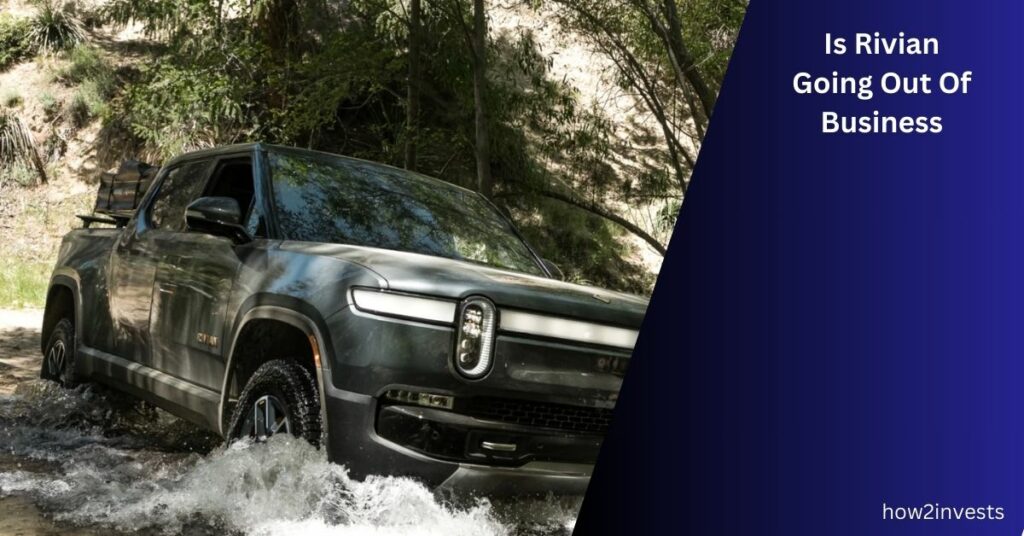Is Rivian Going Out Of Business?

In recent months, rumors and speculations surrounding the financial stability of Rivian, the electric vehicle (EV) manufacturer, have been circulating in various media outlets and online forums.
Questions about the company’s financial health and its ability to sustain operations have led to concerns among investors, customers, and the automotive industry at large.
In this article, we will delve into the current state of Rivian, examining its financial standing and addressing the speculations regarding the company’s future.
Table of Contents
Rivian’s Background:
Founded in 2009 by R.J. Scaringe, Rivian quickly gained attention for its ambitious goal of producing electric vehicles with a focus on adventure and sustainability. The company gained widespread recognition for its R1T pickup truck and R1S SUV, both of which garnered positive reviews for their innovative design and impressive specifications.
Funding and Investments:
Rivian has attracted significant investment over the years, with major contributions coming from high-profile companies like Amazon and Ford. The company successfully raised billions of dollars in funding rounds, showcasing the confidence investors have in its vision and potential.
These substantial investments have allowed Rivian to develop its electric vehicles, build manufacturing facilities, and establish a presence in the competitive automotive market.

Production and Deliveries:
As of the last available information, Rivian has started production and deliveries of its R1T pickup truck and R1S SUV. The initial reviews from customers and automotive experts have been generally positive, highlighting the quality and performance of Rivian’s electric vehicles. The company’s ability to deliver on its promises and bring its products to market is a positive indicator for its future prospects.
Market Position and Competition:
Rivian operates in a highly competitive market alongside established players and emerging EV manufacturers. While the demand for electric vehicles is on the rise, companies need to navigate various challenges, including production scalability, supply chain disruptions, and evolving consumer preferences. Rivian’s success in establishing a foothold in this competitive landscape will be crucial for its long-term sustainability.
Addressing the Rumors:
Despite the positive aspects of Rivian’s journey so far, rumors of financial instability have caused concern among stakeholders. It’s essential to note that the automotive industry, particularly the EV sector, is capital-intensive, and companies often face challenges in the early stages of production and market entry. However, attributing financial difficulties to bankruptcy or insolvency may be premature and speculative.

Financial Landscape:
To gain a deeper understanding of Rivian’s financial situation, it’s crucial to examine key financial indicators. While the company has secured substantial investments, the automotive industry’s capital-intensive nature demands significant upfront investments in research, development, and production facilities.
The initial phases of bringing a new vehicle to market often incur high costs, and this is a common challenge faced by many companies in the industry. Rivian’s ability to manage these expenses, allocate funds wisely, and generate revenue through vehicle sales will play a pivotal role in determining its financial stability.
Additionally, assessing the company’s cash flow, profitability, and debt levels provides insights into its financial health. Publicly available financial reports, when scrutinized, can offer a more accurate picture of Rivian’s fiscal standing. Investors and industry analysts closely monitor these metrics to gauge a company’s ability to meet its financial obligations and fund future growth.
Production Challenges and Scaling:
One of the hurdles faced by many emerging automotive manufacturers is the transition from small-scale production to mass production. Scaling up production capabilities while maintaining quality and meeting delivery timelines is a complex task.
Any delays or inefficiencies in this process can strain a company’s financial resources and reputation. Rivian’s ability to successfully scale its production, overcome supply chain challenges, and meet the growing demand for its electric vehicles will be crucial for sustaining its business in the long run.

Rivian has been transparent about the challenges it has faced, including delays in production timelines. However, it’s essential to distinguish between normal production challenges and systemic financial issues.
The company’s strategic responses to these challenges, such as optimizing production processes and addressing supply chain bottlenecks, will provide valuable insights into its resilience and adaptability.
Market Perception and Consumer Confidence:
Public perception and consumer confidence play a significant role in the success of any company, especially in the automotive industry. Rivian has generated substantial hype and interest in its electric vehicles, attracting pre-orders and partnerships. However, sustaining and building on this positive momentum is crucial for long-term success.
Consumer reviews, brand loyalty, and the overall market sentiment towards Rivian’s products are integral components of its continued viability.
Monitoring these aspects provides a nuanced perspective on how well the company is meeting customer expectations and maintaining a positive brand image. Strong consumer confidence can translate into sustained sales, while negative perceptions may pose challenges in the competitive EV market.
Strategic Partnerships and Future Outlook:
Rivian’s strategic partnerships, particularly with industry giants like Amazon and Ford, contribute significantly to its overall standing. These partnerships extend beyond mere financial support; they often involve collaboration on technology, distribution, and market access.
Analyzing the dynamics of these partnerships and how they align with Rivian’s long-term strategy can offer valuable insights into the company’s potential for growth and resilience.
Furthermore, examining Rivian’s future plans, including potential expansion into new markets, development of additional vehicle models, and advancements in technology, provides a forward-looking perspective.
A robust and well-executed strategic roadmap can instill confidence in investors, customers, and industry observers regarding Rivian’s ability to navigate challenges and thrive in the dynamic electric vehicle landscape.
Conclusion:
While the rumors surrounding Rivian’s financial health have stirred up discussions, it is crucial to rely on verified information and official statements from the company. As of now, there is no concrete evidence to suggest that Rivian is going out of business.
The success of its electric vehicles, strategic investments, and ongoing production efforts position Rivian as a key player in the rapidly evolving electric automotive industry.
As the market continues to unfold, keeping a close eye on the company’s official updates will provide a more accurate picture of Rivian’s future trajectory.